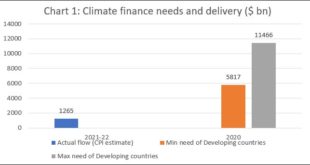from Andri Stahel and RWER issue 106 Imagine some interstellar anthropologists trying to understand our tribe, the earthlings. On the one hand, they would see a part of the tribe devoted to understanding the functioning of all our Earth systems. Called ‘scientists’, these tribe members command great respect and funds. This function was once held by the shamans and sorcerers who claimed to speak to the spirits who inhabited it; then, it was taken by the priests and theologians...
Read More »With one word economics lurched into fantasy
from Steve Keen and RWER issue 106 Human society is energy blind. Like a fish in water, it takes for granted the existence of that without which it could not survive. As with so many of humanity’s problems, this conceptual failure can be traced back to an economist. However, the guilty party is not one of “the usual suspects”—Neoclassical economists—but the person virtually all economists describe as “the Father of Economics”, Adam Smith. Smith led economics astray on the vital issue of...
Read More »What does it take to move towards the goals of a healthy economy?
from Neva Goodwin and RWER issue 106 A healthy economy is one that operates so as to achieve its goals, with relatively little of the overall economic activity working against them. There are obviously a great many things that can be said about what it takes to achieve this; here I will only address one set of requirements. This refers to the fourth essential economic activity mentioned above: maintaining the resources required for the other activities of production, distribution, and...
Read More »Another COP-out
from C.P. Chandrasekhar and Jayati Ghosh Following the COP28 Summit, there is an attempt to establish that the conference was a significant step forward in the effort to address the causes and consequences of climate change. However, a reading of the actual outcome only illustrates how the resistance of the developed countries to own up to their historical responsibility as emitters is stalling the effort to combat climate change and manage the consequences of the changes already...
Read More »Textbook teaching in economics is not consistent with life processes and physical laws
from James Galbraith and RWER current issue An economic theory that is consistent with life processes and physical laws is necessary for a simple reason: the economic theory that underlies modern “mainstream” economics and practically all textbook teaching in economics is not consistent with life processes and physical laws. And this is a problem. Human beings are living organisms. All human activities, including mental activities, are consistent with physical laws. It is natural to...
Read More »The canonical growth imperative
from Gregory Daneke and RWER issue 102 Emerging ecological ideas . . . rushed headlong into the canonical growth imperative of the mainstream. Anyone who uttered ecology and economics in the same breath was bullied and harassed going as far back as the 19th century, but the battering became more intense in the late 1970s as Neoliberalism was fully asserting itself in the halls of power (Reagan, Thatcher, etc.). The unrelenting and scurrilous ad-hominem attacks on the scholars associated...
Read More »There is no economy which exists apart from the ecologies which sustain it
from Peter Newell and RWER issue 101 All wealth in the end is ecological. Economists contend that growth can continue indefinitely because they measure growth in terms of economic value rather than material throughput (Jackson and Victor 2019). Yet we diminish natural wealth and undervalue its exhaustion at our peril. Even in a highly financialised and service oriented economy, where direct connections to patterns of resource extraction and consumption are sometimes less observable,...
Read More »The 9th principle. Meticulous administration.
No Christmas celebration on this blog this year. But a story about communities: the Commons of Buren and Hollum on the Waddensea island of Ameland. Commons have been studied by Elenor Ostrom. Studying Commons is of prime importance: we only have one earth. Reading Ostrom makes one optimistic. One of the things she mentions is the age of commons. Often, they survived centuries. Commons, which invariably voluntarily set limits on the use of resources, are sustainable. The Ameland Commons...
Read More »new and special issue of RWER
Please click here to support this open-access journal and the WEA real-world economic review issue no. 106 download whole issue Special IssueHow can we construct an economics consistent with the biophysical limits to economic growth? Invitation 3 PART I – PARTIAL ANSWERS TO THE QUESTION Economics as if ecology matteredPeter Newell 5 An economic theory compatible with life processes and physical lawsJames Galbraith 13 Supporting well-being over time: Six kinds of capital required in a...
Read More »Something about prices (IV). Gift exchange prices.
Not all prices are market exchange prices. I’ve been writing about administered prices (here and here) and ‘commons’ prices (here). In January, I hope to make a first small step towards a badly needed periodic table of prices. Today a new element, Gift Exchange Prices. Gifts are like the Greeks. They come in many varieties. But always, something is transferred from somebody to somebody, even when there often is no market price or even transfer of ownership. There might be a transfer of...
Read More » Real-World Economics Review
Real-World Economics Review



